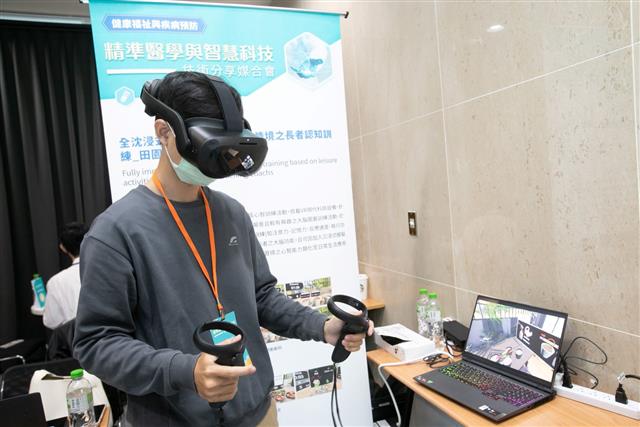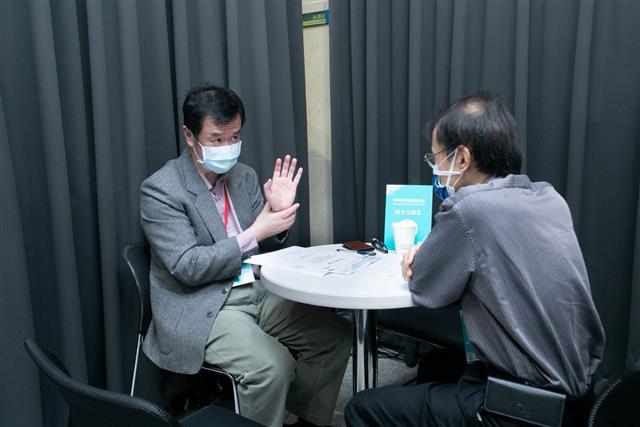With big data, artificial intelligence and cloud computing technology all becoming highly developed, precision medicine - a sector that has relied on these advanced technologies for accelerated development - has in recent years become a crucial force of the medical industry. The Office of Technology Development and Industry Liaison (OTDIL) of Chang Gung University held on October 21 the "Precision Medicine and Smart Technology Technical Sharing & Matching Session," jointly executed along with the CGU Spark and T4GIP (Global Industry Platform) program. Medical industry experts from Taiwan Landseed Hospital, Chang Gung Memorial Hospital, National Taiwan University, National Tsing Hua University, Fu Jen Catholic University, National Central University and Yuan Ze University were invited to unveil the latest technologies and give talks.
Ching-Shiun Chen, dean of Chang Gung University's OTDIL, stated in his speech that experts from all sectors in Taiwan must join forces to attain the goal of advanced precision medicine, and that the outcomes of the SPARK program have been spectacular in this respect. Apart from SPARK, close collaborations between various domestic scientific research platforms and academic units have also been established. Chang Gung University has for instance recently forged many cases of cross-domain collaboration, and with outcomes becoming increasingly apparent, the University is hoping to continue broadening the scope of matching so as to maximize the value of academic research.
Regarding industry-academia collaborations within Taiwan's medical industry, Huan-Cheng Chang, dean of Taiwan Landseed Hospital, is greatly in favor of this direction of development. In his speech, he indicated that his hospital now employs over 200 attending physicians coming from the medical centers of Taiwan, and that over the past few years the hospital has been actively seeking collaborations with domestic academic research institutions to cultivate talent and optimize the medical service experience. In the future, he hopes to see more instances of technology transfer in partnership with Chang Gung University so that the seeds of scientific research can bear fruit in real medical practice.
Yufeng Jane Tseng, associate chairman at the Department of Computer Science & Information Engineering and director of SPARK Taiwan, also shared her experience as an entrepreneur. According to Tseng, Taiwan's academic and research institutions have produced massive amounts of research outcomes that have not been realized within the realm of real medical practice due to lack of liaison with pharmaceutical companies, and that she herself has been the victim of such a predicament. After joining the SPARK platform, which assigns mentors and investors to impart knowledge and give training, she was able to learn the ins and outs of project management, relevant laws and regulations, technology marketing and other professional knowledge, all of which ultimately enabled her to commercialize the fruits of her research labors. With her personal experience as an example, she encourages the academics and researchers of Taiwan to step out of their comfort zone and seek collaborative opportunities with the industry sector for the health and well-being of the greater community.
To help members of the domestic medical industry better understand current and future trends in precision medicine, multiple industry experts have been invited to speak on research outcomes in four major research domains, including health, well-being and disease prevention; precision testing and treatment; telemedicine and precision care; and medical information and more. Thirty-one sets of posters on research technology were also exhibited at the event site, while 28 rounds of one-on-one matching sessions between businesses in the medical industry and the representatives of technical teams were conducted to promote exchange and encourage collaborations between industry and academia.
With its talks, an array of research outcomes and matching services, the event attracted the participation of a total of 43 businesses from the domestic medical industry.

Participants at the event

Technical team demo (VR Gardening Trainer-technology by Ching-Yi Wu and I-Ching Chuang, Chang Gung University)

Onsite one-on-one matching session (Left: Wen-Yen Lin of the Department of Electrical Engineering, Chang Gung University)
Photos: DIGITIMES, October 2022




